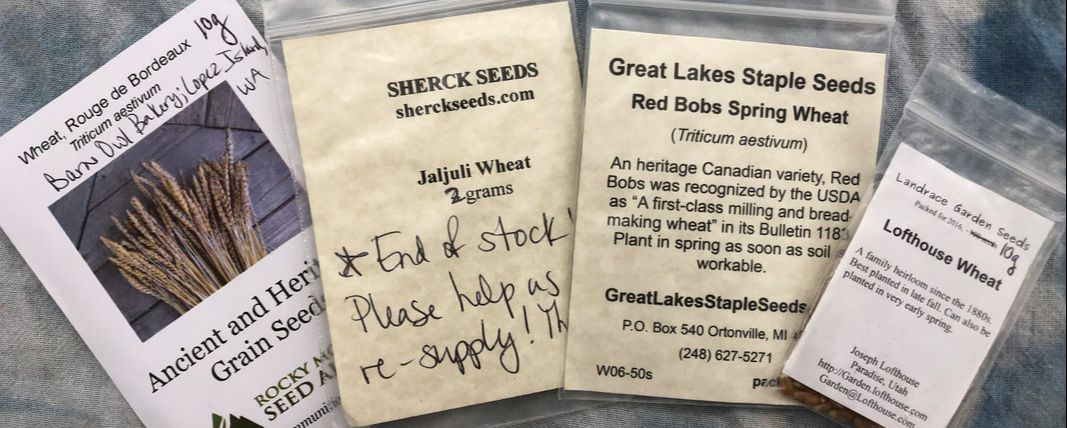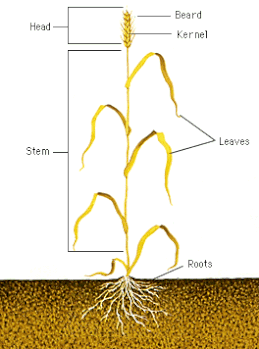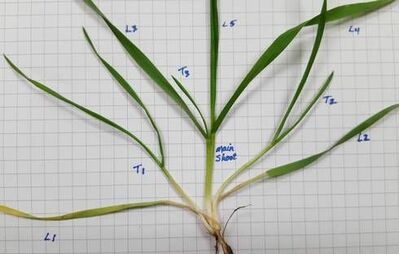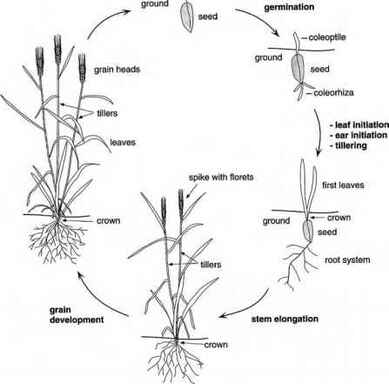The greatest service which can be rendered any country is to add an useful plant to its culture; especially a bread grain. - Thomas Jefferson
Evolutionary Plant Breeding
Resilient Wheat
Task
|
Breed a new landrace variety of bread wheat (Triticum aestivum subsp. aestivum) that is resilient to changing climatic conditions and is disease- and pest-resistant.
Evolutionary Wheat BreedingThis project is inspired by the work of Salvatore Ceccarelli, PhD, who worked in Syria before the war and was able to rescue some of their traditional varieties before having to leave the country. You can read more about evolutionary wheat breeding being done at the Occidental Arts and Ecology Center.
|
Science Vocabulary: Wheat
|
For general plant breeding vocabulary, visit the Plant Breeding page:
|
Wheat Foundation Seed
We would like to thank the Rocky Mountain Seed Alliance, Joseph Lofthouse, and the USDA's Germplasm Resources Information Network (GRIN) for providing our foundation (starting) seed for this project. Here is our template to collect information on the original characteristics of the variety. These are the varieties that we started with for our Evolutionary Wheat Breeding Project:
|
Australian White
Black Eagle Wheat |
We have 27 varieties that we will eventually be growing together & listing here. Not all will be grown Year 1 (2019) because we promised to maintain varietal purity and restock some. We have limited space and need to maintain isolation distances, which limits how many we can grow this year.
|
Trial Basic Guidelines
Information from Rocky Mountain Seed Alliance's Ancient Grain & Heritage Trial Program.
Steps |
Our Actions/Choices |
Identify your trial goals. Do you want to grow heritage grains for your own consumption? Will you bake with them? Roll them and eat them for breakfast? |
Breed a wheat that thrives even in extreme weather conditions and with increased pest and disease pressures. The wheat will be used to bake bread. |
Choose and prioritize traits. Make sure you are clear as to what is most important for you, ex. drought tolerant, easy to thresh, taste, productive, early/late producing, heat tolerant, rust-resistant, blight-resistant. |
1. Drought tolerant 2. Productive 3. Early producing 4. Heat tolerant 5. Great for making bread - tasty! |
Include a check variety. Always plant a familiar standard variety in your trials. This provides an important comparison and a point of reference with which to compare your results. It also allow you to compare growing conditions year to year for your entire trials. |
Albimonte wheat (Triticum aestivum L. subsp. aestivum) is our familiar standard variety. This seed was obtained through the U.S. National Germplasm System. |
Be on the look out for the "field effect." The field effect refers to changes in the success of crops due to environmental variations across your fields (or garden plots). These differences could be variations in temperature, wind, water, soil fertility, etc. Ideally, it is good to plant the same variety in different parts of your garden in "replicated trials." When you different plant the same variety in different parts of your garden, then you get more of an average growing condition and this helps to prevent the "field effect", which might make you think a crop does poorer or better, but it has more to do with some environmental difference in your garden such as more sunlight or water. |
Seed will be planted in spring 2019. No observations at this moment to report. |




